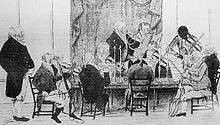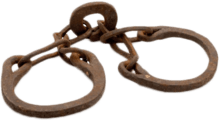Joseph Antonio Emidy
Joseph Antonio Emidy (1775 – 23 April 1835) was a Guinea-born musician who was enslaved in early life, before becoming a notable and celebrated violinist and composer in Cornwall, South-West England.
Life
Born in Guinea, Emidy was sold into slavery as a child to Portuguese traders who took him to Brazil and later to Portugal. In Portugal, he became a virtuoso violinist in the Lisbon Opera. He was press-ganged by British Admiral Sir Edward Pellew during the Napoleonic wars and spent the next four years as a ship's fiddler.[1]
Music

In 1799, Emidy was abandoned in Falmouth, Cornwall, United Kingdom. In Falmouth, he earned his living as a violinist and a teacher. He became the leader of the Truro Philharmonic Orchestra, and went on to become one of the most celebrated and influential musical figures in early 19th-century Cornwall. He composed many works, including concertos and a symphony, but no known copies survive.[2]
Personal life
In 1802, he married Jane Hutchins, a local tradesman’s daughter,[3] and they had eight children. They moved to Truro around 1815.
Death

He died in Truro, Cornwall, and his grave is in Kenwyn churchyard.
Transcript of his gravestone reads:
HERE LIE DEPOSITED The mortal remains of Mr Jos:h Antonia Emidy Who departed this life, On the 23:rd of April 1835 AGED 60 YEARS
And sacred to whose memory This tribute of affection is erected By his surviving family.
He was native of PORTUGAL Which country he quit about forty years since and pursuing the Musical Profession, resided in Cornwall until the close of his earthly career.
Devoted to thy soul-inspiring strains, Sweet Music! Thee he hail'd his chief delight And with fond zeal that shunn'd nor toil nor pain His talent sear'd, and genius mark'd its flight In harmony he liv'd, in peace with all Took his departure from this world of woe, And here his rest, till the last Trumpet's call, Shall 'wake mankind to joys that endless flow.
Tributes
On 24 March 2007, during a service at Kenwyn Church to mark the 200th anniversary of the parliamentary abolition of the slave trade throughout the British Empire, the life of Emidy was featured and some typical pieces of music from his time were played in tribute.
Emidy is the subject of a play by Dr Alan M. Kent, The Tin Violin.[4]
In 2015 a carved wooden boss was erected in Truro Cathedral in his memory.[5]
See also
- Samuel Coleridge-Taylor another black English composer (1875-1912)
References
- ↑ Boyle, Laura (2013). "Admiral Edward Pellew: The true history of this most novel Captain - Jane Austen Centre". janeausten.co.uk. Retrieved 29 May 2013.
- ↑ Cornwall, musicians, history Archived 11 November 2007 at the Wayback Machine. (British Association for Local History).
- ↑ Costello, Ray (2012). Black Salt: Seafarers of African Descent on British Ships. Liverpool University Press. Retrieved 29 May 2013.
- ↑ Kent, Alan (2013). "The Tin Violin 2012 | Bish Bash Bosh Productions". bishbashboshproductions.co.uk. Archived from the original on 18 July 2013. Retrieved 29 May 2013.
- ↑ Miles Davis (21 June 2015). "Joseph Emidy: From slave fiddler to classical violinist". BBC News Online. Retrieved 23 June 2015.
Sources
- He is mentioned at length (pp. 163–172) in the autobiography of James Silk Buckingham (MP for Sheffield), which was published in 1855.
- [-?-] "My Hero Joseph Emidy", BBC History magazine, October 2001
- Richard McGrady, Music and Musicians in Early Nineteenth Century Cornwall: the world of Joseph Emidy - slave, violinist and composer. Exeter: Exeter University Press, 1991, ISBN 0-85989-359-6
- Richard McGrady, "Emidy, Joseph Antonio (c.1770–1835)", Oxford Dictionary of National Biography, Oxford University Press, 2004; accessed 11 October 2007.
External links
- Official homepage
- Trail marks abolition anniversary (BBC News Story)
- The Emidy Violin Concerto A Project from Jon Rose. Accessed June 2008
